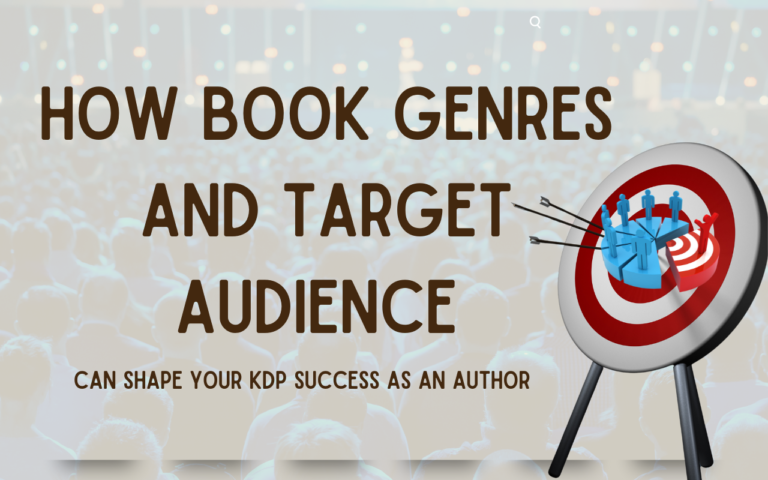Why should Authors care about SEO: Top 6 Strategies
Writing takes a lot of effort. So many things go into the process of putting thousands of words together to make a cohesive story. But in today’s digital world, it doesn’t stop there. It’s not enough just to write a great book. You need to make sure people can actually find your work.
Especially if you’re self-publishing, there needs to be a way for people to see your book. That’s where SEO content writing comes in. In this article, we’ll discuss fully why you need professional SEO content writing as an author and how it can help you make more sales. So, let’s jump right in.

What is SEO Content Writing?
Before we get into why you should do it at a professional level, let’s first understand what search engine optimized (SEO) content writing is.
“SEO content writing is simply writing creative content that isn’t just interesting to read but also helps your website rank higher in the search engine results page.”
MailChimp also states it’s proper defination “Search engine optimization (SEO) is the practice of orienting your website to rank higher on a search engine results page (SERP) so that you receive more traffic. The aim is typically to rank on the first page of Google results for search terms that mean the most to your target audience.“
It is writing with two purposes blended into one: storytelling and marketing. And if you want to market your book through a website, you have to pay close attention to it. Statistics show that 96% of the top 1 million websites don’t pass accessibility standards. This means you have to pay close attention to your SEO strategy, and there’s an opportunity to be taken when you start to pay important attention to your SEO.
SEO Content Writing vs. Regular Content Writing
How does SEO content writing compare with regular content writing?
What makes a piece of work search engine optimized as opposed to being regular?
There are a few key differences between both kinds of content writing that will be highlighted in the table below for easy referencing.
| SEO Content Writing | Regular Content Writing | |
| Main focus | Search engine optimization, accessibility, and engagement | Little or no search engine considerations, focused on readers |
| Technical elements | Uses keywords, meta tags, internal and external links | Little to no technical elements |
| Goals for performance | Higher Search Engine Results Page ranking | Engagement and interest |
| Longevity | Potentially gain traffic long-term | Reader interest in the short-term |
So in simple terms
SEO Content Writing
The goal of SEO content production is to provide information that will rank highly on search engines such as Google by using tactics like meta descriptions, internal and external links, and appropriate formatting in addition to the appropriate keywords and backlinks.
Moz, Neil Patel, and Backlinko, are excellent examples of material that is SEO-focused.
Regular Content Writing
Regular content writers don’t worry as much about search engines and instead concentrate on writing for the reader. It all comes down to producing material that is easy to read.
Medium and BuzzFeed are the best examples of these type of content, where the focus is more on telling stories or producing pieces that are easy to share than on search engine optimization.
Why Should Authors Care About SEO?
The key to effectively promoting a book, blog post, or even a short essay is to make sure the correct people see it. Using SEO is one of the best methods to accomplish this.
But why is SEO specifically important to authors?
For me as an Author, It’s a powerful strategy that can help you reach a wider target audience, improve exposure, and establish a more robust online presence. It’s not just a technological tool BUT a powerful strategy. For the following reasons, SEO is crucial for writers:
1. Increased visibility leading to organic traffic
One of the primary reasons SEO is so important is because it helps increase visibility. The search engines like google, chrome is by far the most efficient way to gain traffic on your page. 47.8% of all web traffic comes from organic search after all so your work will rank higher on search engine results pages (SERPs) if you optimize it for search engines. Good SEO practices will push your content “your book or blog” up the search engine results page and make sure readers actually see it even if they’re just casually browsing the internet. This can lead to you becoming an authority in your desired niche. so, this way, you are more likely to receive organic traffic—free, regular visits from people who are interested in your niche—the more visible you are.
For example, prominent digital marketing expert Neil Patel claims that SEO accounts for over 90% of the traffic to his website. Authors can increase their reach and establish a stronger connection with readers by following his tips for producing SEO-optimized content.

2. Authority and credibility in your niche
Search engines don’t merely search for any content; they give preference to content that exhibits experience, expertise, authoritativeness, and trustworthiness (E-E-A-T). You increase your chances of being acknowledged as an authority in your genre by devoting time and energy to SEO. This is essential for writers, particularly when trying to attract readers in a cutthroat industry.
Consider how Stephen King and J.K. Rowling are regarded as leaders in the field of literature. Even in a saturated market, their relevance and visibility are maintained through effective SEO strategies on their websites and content, even while their celebrity and experience add to their authority. Your viewers will see that you are a reliable source in your field if you rank well on search engines.
3. Targeted Reach to the Right Audience
The people who are actively searching for the type of content you provide are the audience that SEO helps writers reach. You can draw in readers who are truly interested in your genre or specialty by concentrating on the appropriate keywords. Given that these visitors are already looking for what you have to offer, this could result in more meaningful engagement and even higher purchases.
As an example, consider the best-selling thriller author Mark Dawson. By effectively targeting readers in particular genres with Facebook advertisements and Amazon SEO with proper PPC Campaigns, Mark has increased his conversion rates by making sure his books are read by people who are most likely to appreciate his writing.
Basic SEO Strategies for Authors
1. Research and Use Keywords Strategically
The first step towards proper SEO is good keyword research. You want to know what people are talking about, what they’re searching for, what they’re reading, and what they’re looking for. This is the foundation of SEO success. Identify the phrases your target readers are likely searching for, such as:
- “Best new fantasy authors 2024”
- “Top fantasy books for young adults”
- “Historical romance novels with strong female leads.”
Use these keywords naturally in your book titles, descriptions, blog posts, and website content.
Some amazing tools you could use to find keywords are Ahrefs, SEMrush, ubersuggest and Google Keyword Planner. These will help you find the best keywords so that you can smoothly integrate them into your content.
💡 Tip: Long-tail keywords (e.g., “thriller novels for young adults”) are less competitive and can attract highly targeted traffic.
2. On-page SEO
On-page SEO is the optimization that happens on the pages of your website. This is very important, as your website itself has to be of remarkable quality before the search engine can present it at the top of the search results. Make sure it loads quickly, is mobile-friendly, and is simple to use. Add a blog, book summaries, links for purchases, and a “About Me” page. Add pertinent keywords to picture alt tags, meta descriptions, and meta titles.
Here are a few ways to achieve on-page SEO:
- Meta descriptions: these are keyword-rich descriptions of your content that you can add to the description of your content.
- Header tags (H1, H2, H3, etc.): these are headers that could be added to the formatting of your post. They help make your articles easier to navigate.
- Alt text: Alt texts are hidden descriptions of images to help readers navigate your web page even better. Make sure to always use them. They give your SEO score a serious boost.
💡 Example: Instead of a generic description like “New Book Out Now,” try “Discover My Latest Mystery Novel – Available on Amazon KDP.”
3. Quality content
Always keep in mind that the search engine favors experience, expertise, authoritativeness, and trustworthiness. These are things you can only achieve if your content is of high quality. Also, while you make quality content, ensure that you make your content as unique as possible. Blogging is a fantastic method to interact with readers and enhance the SEO of your website. Posts that respond to frequently asked questions by readers, including “What inspired my latest novel?” or “8 Tips to Help You Sell Volumes as an Author,” are highly engaging. Add internal links to other pages on your website, use headers to organize material, and include your keywords.
💡 For example, include a call-to-action in your blog post, such as “Check out my new release here,” that links to your book’s Amazon page.
4. Internal and external linking
Links are bridges that point readers around your website and help search engines understand your website’s structure. When optimizing your content, there are two kinds of links you should add for proper optimization:
- Internal links: These are links that point to related content on your website. They keep readers interested, improve navigation, and demonstrate to search engines how well-structured your information is. For example, if you’re writing an article on “writing an interesting story,” you can attach a link to a previous article on “how to write a compelling character”. You should use descriptive anchor text (e.g., “Learn how to create unforgettable characters” instead of “Click here”) to improve both usability and SEO.
- External links: these are links that lead to related content outside of your website. They are mostly used to reference data gotten from reputable sources. If you can do that on your content, you’re sure to give your SEO score an unimaginable boost. For example, if you’re writing on “The Importance of Author Branding,” you can increase the credibility of your material by including a link to an article from a reliable source like Forbes or The Guardian.
According to Backlinko, pages with backlinks from multiple reputable domains experience significantly better rankings. So, while you’re linking out, focus on creating valuable content that other sites would want to reference.
You can ue tools like Moz, Ahrefs, or SEMRush to analyze your backlink profile and identify opportunities to gain more links.
5. Consistent up-to-date content
Sometimes information may get outdated, or other creators might put up better optimized content than yours. This is why you can’t make content and leave it there. You have to keep updating to make sure your website stays in the game.
In addition to keeping your audience informed, updating your resource pages, book descriptions, and blog entries tells search engines that your website is current and worthwhile.
💡 For instance, if you produced an article on “Top Publishing Trends for 2022,” update it with new information and examples for the current year.
6. Long-term strategies
Proper SEO can bring traffic to your website for a long time without you having to monitor it or pay for anything. As long as you make sure your content and website are always optimized, you’ll gain traffic for as long as possible without having to domuch by yourself.
This is a lot more efficient than running paid ads.
Here are a few long-term strategies you can use to secure those long-term benefits:
- Update old posts with fresh content and keywords.
- Expand on your readers’ favorite topics
- Create content that stays relevant for many years.
Without further work, your content can draw readers for years after it has been optimized. A well-written post about “How to Self-Publish Your First Book,” for example, will continue to be relevant to aspiring writers and generate organic traffic for years to come.
A very popular example of an author gaining success from writing content is Andy Weir, who famously wrote The Martian and Children of Time. He started out by posting excerpts on his website for interested readers. A lot of said readers were scientists who helped him see the story to the end. Andy Weir may have used a different content writing route from other authors, but he posted content that was unique, authentic, and easily marketable, which led to the success of his debut novel.
How to begin your SEO content writing journey as an author
Now that you know what SEO content writing is and why you should do it, it’s time to dive right into it. So here are a few tips to help you start your SEO content writing journey as an author.
- Hire an SEO content writer: The simplest way to get around creating search engine optimized content when you have other things to focus on, like writing a book, is to hire a content writer. If you’re wondering where to find one, at Pro Ghostwriting Hub, we have just the thing. Our SEO content writers will manage your author websites professionally. OR this article could help you in this process “How to choose the right content creation service for your project?”
- Use SEO tools: There are lots of tools on the internet to help your website’s SEO. Find one that’s within reach and affordable for you. (Stay tuned to get complete guide on this on our next article- Subscribe us)
- Analyze performance: when it’s all said and done, you need to see how well your site is performing. Google Analytics and google search console are very helpful tool to monitor your site’s performances and engagements to make changes where it’s necessary.
In conclusion…
SEO content writing isn’t just a trend; it’s a marketing strategy that can lift you to levels of success you didn’t think was possible. So, take the risk. Invest the effort. You’ll give your work a better chance of standing out to the crowd.
As a parting tip, it is also important to mention that ProghostWritingHub offers professional services to authors to help them write, edit, proofread, and even create outstanding book covers. We can also help you begin your SEO content writing journey by helping you find a professional SEO content writer. Anything from helping you write your book to helping you market it. And we are only a click away.






